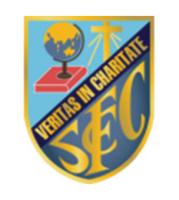| Language Policy |
English is used as the medium of instruction in all subjects except Chinese Language, Chinese History, Putonghua, Information Literacy and Religious & Moral Education. The school aims at developing trilingual and biliterate competence in students. Apart from regular language classes, Apart from regular English classes, students are given the opportunity to enjoy language activities at the English Café outside class time. The English Ambassadors Union was set up in 2022 to engage students in the building of a conducive English-speaking environment at school. |
| Learning and Teaching Strategies |
The school adopts student-centred inquiry-based approach to teaching and fosters independent learning. Teachers motivate students to learn by means of questioning, group interaction, experiments and use of IT. Students are also encouraged to take the initiative to acquire knowledge and seek the truth. Taking into account students’ interests, the school curriculum is constantly revised to meet the needs of society. Through the adoption of the school-based Integrated Science curriculum, project learning and Language Across the Curriculum, students' generic skills such as creative thinking, critical thinking and communication skills can be enhanced. The Drop Everything And Read (DEAR) reading programme, which takes place every day aims at broadening students' scope of knowledge, enhancing their Chinese and English language proficiency and promoting reading in students' leisure time. In order to facilitate eLearning, the school has implemented the Bring Your Own Device (BYOD) initiative for S.1 to S.3. |
| School-based curriculum |
1. Electives: 2X and 3X. Every S.4 student is required to take three electives so as to gain knowledge from various disciplines. The school has also systematically introduced the Other Learning Experiences (OLE) that align with the New Academic Structure to complement academic learning.<br> 2. Curriculum highlights: Through the adoption of the school-based Integrated Science and Information Literacy curricula at junior level, as well as project learning and reading across the Curriculum, students' generic skills such as creative thinking, critical thinking and communication skills can be enhanced. |
| Approach to Catering for Learner Diversity |
Each subject department has devised their own strategies to cater for learner diversity, for instance, the introduction of enrichment Mathematics courses, remedial Chinese, English and Mathematics classes in the lower forms and the streaming of S.1 students according to their level of proficiency in the Chinese language, the English language and Mathematics. To accommodate the diverse range of students' Chinese language proficiency in S.1 and S.2 levels, students in each of these two levels are assigned to five different Chinese classes. This allocation allows for a more tailored approach to meet individual learning needs. Small-group supplementary classes are arranged for S.5 and S.6 students to brush up on their skills.<br><br> |
| Approach to Integrated Education |
The SEN Team caters to the special educational needs of the SEN students by means of classroom seating arrangement, homework accommodation, examination arrangements and provision of counselling service by the school social worker and support for parents. Every year, the team holds regular meetings during which various measures for assisting SEN students to overcome their learning difficulties are discussed and considered from every angle. |
| Education Support for Non-Chinese Speaking (NCS) Students |
|
| Home-School Co-operation |
Parents' seminars for different levels are held every year. Workshops on parent-child relationship and communication skills are organized. Parents work as volunteers assisting in school functions, for example the Sports Day, the school picnic and field trips. PTA newsletters are published regularly with the aim of strengthening ties between the school and parents. |
| School Ethos |
The school has an ethos of simplicity. The Student Support Coordinating Team oversees various school programmes for fostering students' whole person development held by the Counselling Team, the Careers and Life Planning Education Coordinating Team, the Civic Education Team and the Sex and Health Education Team. |
| School Development Plan |
The two areas of concern for 2022-2025 are: <br>1. To reinforce values education to enhance whole-person development of Franciscans.<br>2. To cater for learner diversity by enhancing classroom teaching efficiency.<br><br> |
| Teacher Professional Training and Development |
To enhance teaching and learning, the school provides school-based development programmes that align closely with the school's major concerns for teachers. They are also encouraged to attend various seminars and workshops to keep abreast of latest education trends. |
| Life-wide Learning |
4 houses, 16 clubs which fall into 4 categories: School Teams, Religious Groups, Service and Uniform Groups, and Cultural & Interest Groups. In order to cultivate a spirit of service and a stronger sense of responsibility, each S1 student is required to join one of the uniform / service groups. |
